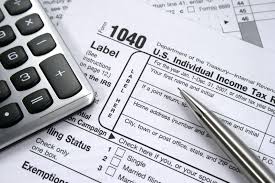
Complaining about taxes is something that everyone does. Most people complain about the amount that they pay or the time that is wasted. Even if you pay someone to prepare your tax return you still never really escape the process. It’s a February, March, or April tradition, depending on your ability to procrastinate.
I’m going to complain not because I have to file but because I want a more complicated tax return. Yes, a more complicated tax return. Here is why?
Looking back in time at my social security printouts you can see how much money you made each year and this serves as an excellent baseline in determining how much work is involved in finishing your return. High school and college meant filling out the 1040-EZ, finishing college and getting your first job meant filling out the 1040. As you begin to save and build a little net worth, Schedule “B” and “D” enter the picture. You learned that student loan interest was deductible, contributions to your 401K account lowered your tax bill, and you began to itemize deductions if you were a homeowner.
Most individuals don’t progress much further than this in regards to the financial complexity of their life. I am happy to report that as a new business owner, I have now added the Schedule C to my list of forms that need to be completed. This year’s return was a little bit more involved but got me thinking about what a really complex tax return might look like and my desire to trade up. I’m not talking about a “Paul Allen” like tax return with 41 interstate tax filings and multiple foreign filings but the tax return for the guy down the street who keeps his house perfectly manicured and has a secret net worth of twenty five million dollars.

This guy or girl has multiple touch points within the local business community and is always getting involved in new endeavors while keeping things simple at home. It doesn’t matter if it’s owning a few small businesses, having a couple of dozen rental properties, or being invested in a whole slew of profitable partnerships, there is a desire to stay engaged.
As long as one’s entrepreneurial instincts remain heightened, complacency levels don’t increase with age, and one continues to have a zest for ideas and opportunity. A future tax return might look something like the following
- A schedule “B” and “D” that are longer than one page
- K-1’s for investments in real estate, private equity, and hedge funds
- Form 8565 with partnership returns
- State filings. Yes, Oregon needs to get paid
- A 709 gift tax return that is close to being maxed out at $5,450,000
- Passive Income
- Charitable Giving
- An AMT calculation
This is exactly the type of tax return that I want. I actually wouldn’t have a problem with completing the paperwork for any of the preceding. I still do my taxes by hand because I enjoy seeing the relationships and interconnectedness of everything and how it all fits together. I would actually welcome this exercise and look forward to paying more. I would likely complain a bit but deep down inside I would be very happy that I have this problem. It would represent not only a degree of success but it would also mean that I followed through on my interests, had some good ideas, and was willing to put time and capital to work towards ideas that I believed would work over the long run. The financial rewards are obvious but the satisfaction of executing your ideas, creating and building something from scratch, and knowing that you have the wherewithal, patience, and skill to complete something in the real world is amazing. The dollar value is just one way to keep score.
As a financial planner and portfolio manager who’s goal is to help clients compound wealth into the future, taxes are a key component. Being tax-smart and tax-efficient goes a long way in helping clients compound capital over time. As your dollar values grow in time, your opportunity set, and the investment options that you have in front of you continues to expand as well. Being an accredited investor as a middle aged man or woman should be like turning 21 again. A new door has opened and you can now go inside.
Fast forward, twenty-five years to the year 2040. What will your tax return look like? Will you be embarrassed? Did you do a poor job at planning for retirement, did you outspend or under save? Did you at least try to get some structure and lift behind your good ideas? Did you miss the chance to compound capital in an efficient way? All of these are things to consider as you move through life and see opportunity.
Taxes are just one way to kind of visualize all of these things. In an ideal world the more complicated things are around April 15th, your probably doing really well and this is exactly what I want to see down the road.
Steve Cole
March 25th, 2016
Salmon Bay Wealth Management


The most positive spin on paying taxes I have ever heard. Instead of viewing it as a nuisance, you have given me an outlook that doing taxes is an excellent time to reflect on what I have achieved and what I need to do to continue toward my goals. Viewing paying more as a measure of my success, makes it seem an almost pleasurable prospect.
Great article with some very interesting original thoughts.
EXCELLENT